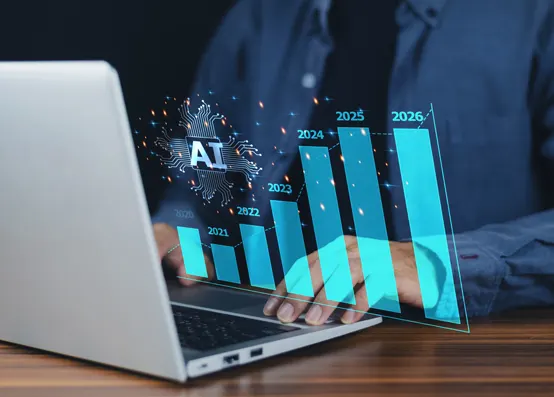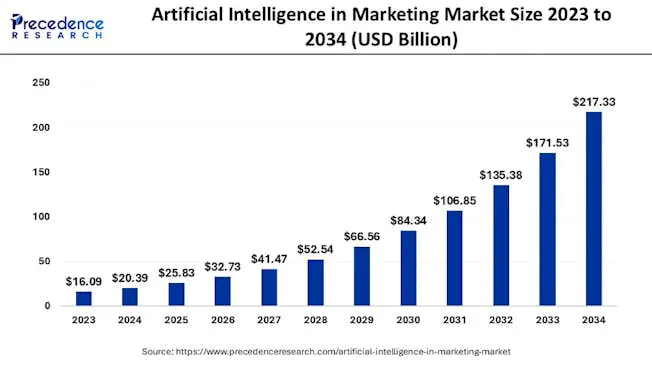
Artificial Intelligence (AI) has becoming increasingly popular in digital marketing. Leading marketers are using AI technologies to boost output, streamline content production, and provide individualized experiences across several platforms.
Key marketing operations like email marketing, SEO, social media marketing, and PPC are being transformed by AI. As a result, marketers must keep up with the latest developments in AI and hone their skills to stay effective, relevant, and up to date.
To see how this technology is influencing the market, let’s examine ten AI in marketing figures.
1. 92% of businesses want to invest in generative AI over the next three years
According to a recent McKinsey survey, 92% of companies in a variety of industries intend to spend money on generative AI tools in the upcoming three years.
Only 1% of companies who have actually implemented generative AI, however, believe their investments have fully matured despite this intense desire. These results suggest that generative AI has not yet reached its full potential and that adoption will only increase in the years to come.
2. The ‘AI in marketing’ market is expected to grow at a CAGR of 26.7% between now and 2034
By 2034, the market for AI in marketing is expected to be worth $217.33 billion, according to studies.
This enormous expansion highlights how AI will only become more and more important in digital marketing over time.

You can future-proof your talents and easily adjust to changes by learning to work with AI and using it to enhance your digital marketing procedures now.
3. Digital marketers use AI tools for a range of processes and tasks
According to a SurveyMonkey survey, tech-savvy, contemporary marketing teams are using AI tools more and more for a number of crucial activities. The breakdown is as follows:
51% use AI to improve content for search engine optimization (SEO) and email campaigns.
50% create material using AI, improving their entire approach.
45% of people use AI to generate concepts and ideas for content.
43% use AI software to automate repetitive operations and procedures.
For their social media approach, 43% believe AI is essential.
41% arrange and analyze data using AI techniques to gain insights.
73% concur that using AI to create a customized consumer experience is essential.
4. AI marketers face challenges over quality concerns (among others)
The difficulties marketers encounter in adopting AI are also highlighted in the same SurveyMonkey survey.
While some marketers are unsure about strategy direction or performance objectives, 31% of marketers voice worries over the precision and caliber of AI solutions. The main conclusions are summarized as follows:
Fifty percent of marketers expect their teams and themselves to perform better.
49% anticipate that the software and tools they use will change.
According to 48% of respondents, AI may soon cause changes in strategy or direction.
While AI has the potential to improve marketing in many ways, scaled success depends on resolving these issues and building a strong foundation inside digital marketing teams.
5. Some marketing pros are reluctant to use AI due to safety issues
Some marketers are reluctant to embrace autonomous technology, according to Salesforce. Indeed, 39% of respondents said they steer clear of generative AI technologies because they are unsure about how to utilize them responsibly.
Furthermore, 43% of marketers have not fully adopted AI solutions and are finding it difficult to get any actual benefit from them, most likely as a result of inadequate training. According to the same survey, 70% of marketing experts claim that their company does not provide generative AI training.
Prioritizing training, ongoing education, and information exchange is crucial for utilizing AI in marketing successfully and achieving long-term success.
6. 75% of companies who use AI for marketing are expected to shift to more strategic activities
Many businesses think AI can improve current employment rather than replace them, despite media stories to the contrary.
75% of businesses that are already investing in AI technology want to shift their employees into more strategic roles this year and beyond, according to Gartner’s recent AI in Marketing report.
The future appears bright for marketers who want to devote their time to tasks that call for more strategic or creative thinking because AI solutions can automate monotonous tasks.
7. 69% of marketing professionals feel hopeful about AI technology and how it could shape their jobs
69% of marketers are enthusiastic about how AI will change their work. There is a noticeable sense of optimism since many companies want to increase the responsibilities that their employees play (statistic number six).
Most marketing experts acknowledge AI’s potential, despite worries that it will replace jobs. They can obtain better insights and increase productivity by collaborating with AI technologies. The secret is understanding how to take use of the appropriate tools and platforms.
8. Over half of marketing teams use AI tools to optimize content
51% of marketers use generative AI tools like ChatGPT to optimize existing content rather than depending on them to create content on specific themes.
Whether improving fresh or pre-existing content, a lot of marketers employ AI solutions to:
- Add relevant target keywords into text as naturally as possible
- Repurposing a piece of content for different platforms
- Reworking a piece of content to suit the needs of different audiences
- Requesting editorial feedback and guidance
These AI use cases demonstrate how human efforts can be supplemented by AI tools to increase marketing results and expedite procedures.
9. 65% of companies have seen better SEO results when using AI
65% of companies claim that using AI solutions has improved their SEO results. This information comes from longshot AI.
According to the majority of SEO experts, AI tools have improved site auditing, content production, and keyword optimization, producing better outcomes.
Autonomous tools will probably become an essential component of strategic SEO procedures as AI technology advances and acceptance spreads.
10. Marketers agree that AI will improve personalization strategies
We expect major improvements in audience segmentation and personalization as more companies become proficient with AI marketing solutions.
Indeed, according to 73% of companies, AI will improve personalization tactics, allowing marketers to more widely distribute value-driven, customized content to target customers.
What can we expect from AI marketing in 2025?
In the upcoming year, more companies will implement autonomous technology, as these AI marketing trends suggest.
However, strategic thinking is essential to staying ahead of the competition and optimizing the benefits of AI marketing technologies. Novela’s founder, Clarke Boyd, offers his perspective:
“With AI, advertisers will have greater power, and the most value will be extracted by those with strategic thinking. Businesses can realize their full potential by comprehending the data and the methods used to create it, particularly when using tools like Google’s Performance Max.
“There is a genuine chance for us to improve our skills and achieve more,” he continues. Being able to use AI more effectively than others provides you a competitive advantage. Learning new talents is crucial.
Businesses will reap major rewards if they adopt cutting-edge AI technologies and use them into their marketing plans.
AI tools are changing digital marketing in a number of ways, including segmentation, SEO optimization, content generation, and ideation. However, as we’ve seen, the best outcomes depend on cultivating a culture of ongoing learning and knowledge exchange.
Human-AI cooperation is necessary for these tools and technology to genuinely provide value. You can make sure AI marketing works for you by experimenting with AI platforms, monitoring results, and keeping up to date.
Use AI to supercharge your marketing activities
In order to achieve more with less time and effort, ambitious marketers need to learn how to create an AI-driven digital strategy. From content production and research to using specialized tools across channels like SEO, social media, and PPC, our Advanced AI for Digital Marketing course will provide you the capabilities to leverage AI for optimizing digital marketing chores. Additionally, you will learn how to use AI to improve planning, optimize your digital strategy, and increase productivity throughout the customer journey. Are you prepared to advance in level? Get started now!

